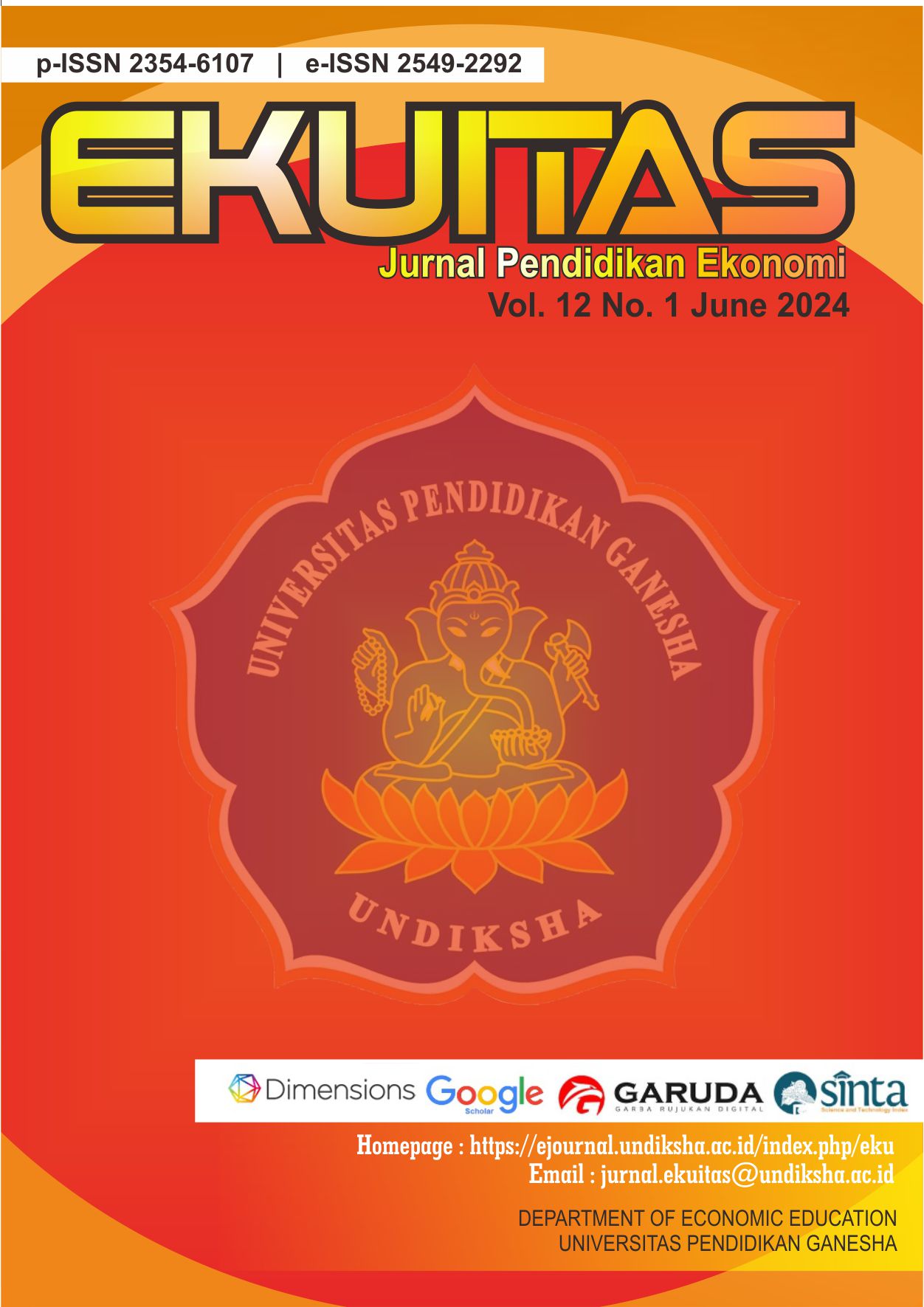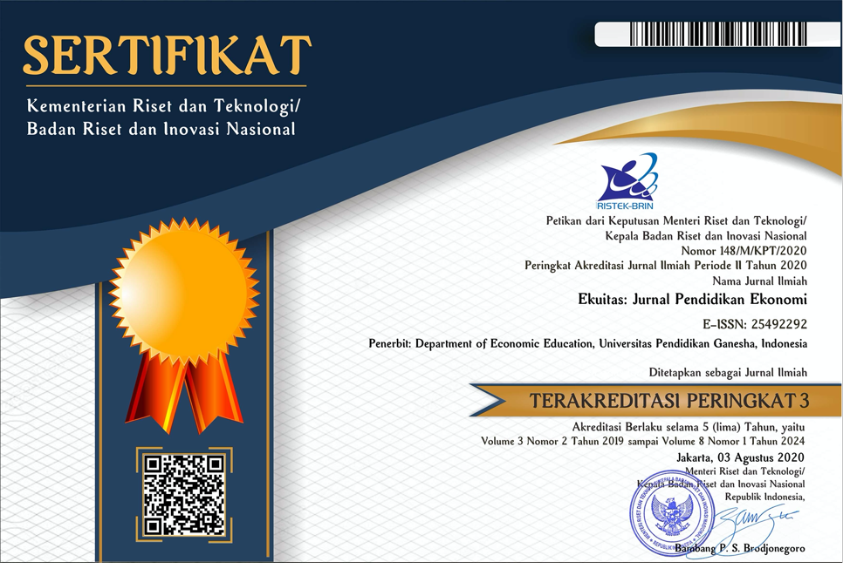The Secret to Successful Investment in Children's Education: Active Parental Involvement in Education
DOI:
https://doi.org/10.23887/ekuitas.v12i1.74349Keywords:
Educational success, children’s education, parental involmentAbstract
The problem of this study is more emphasized on how much influence parents have in educating children to achieve success. The purpose of this article focuses on how to know and understand the impact of factors owned by parents, such as parents' socio-economic status and children's plans through education that parents and rationalization have made of the value of education can affect the success of children's education. The population and sample of the study were parents who currently have school-age children in grade XII in Malang City, with a total population of 19,501 respondents and a total sample of 377 respondents. The sampling technique used Cochran, data collection techniques through questionnaires with a 7-point Likert scale, and analysis techniques using multiple linear regression. The results showed that both simultaneously and partially, it is known that EP, EC, and VR can influence the success of children's education investment. Thus, further action is needed from the parents and the government in this regard to support the implementation of optimal educational investment to increase the child's potential.
References
Barger, M. M., Kim, E. M., Kuncel, N. R., & Pomerantz, E. M. (2019). The relation between parents' involvement in children's schooling and children's adjustment: A meta-analysis. Psychological Bulletin, 145(9), 855–890. https://doi.org/10.1037/bul0000201
Bokayev, B., Torebekova, Z., Davletbayeva, Z., & Zhakypova, F. (2021). Distance learning in Kazakhstan: estimating parents' satisfaction of educational quality during the coronavirus. Technology, Pedagogy and Education, 30(1), 27–39. https://doi.org/10.1080/1475939X.2020.1865192
BPS. (2023). Angka Putus Sekolah (APTS) Kota Malang Menurut Jenis Kelamin (Persen (%)). https://malangkota.bps.go.id/indicator/28/425/1/angka-putus-sekolah-apts-kota-malang-menurut-jenis-kelamin.html
Brown, P., Lauder, H., & Cheung, S. Y. (2020). The Death of Human Capital? Oxford University Press. https://doi.org/10.1093/oso/9780190644307.001.0001
Budiharso, T., & Tarman, B. (2020). Improving quality education through better working conditions of academic institutes. Journal of Ethnic and Cultural Studies, 7(1), 99–115. https://doi.org/10.29333/ejecs/306
Cochran, W. G. (1977). Sampling Techniques. John Wiley & Sons, Inc,.
Cooper, K., & Stewart, K. (2021). Does Household Income Affect Children's Outcomes? A Systematic Review of the Evidence. Child Indicators Research, 14(3), 981–1005. https://doi.org/10.1007/s12187-020-09782-0
Deming, D. J. (2022). Four Facts about Human Capital. Journal of Economic Perspectives, 36(3), 75–102. https://doi.org/10.1257/jep.36.3.75
Hardy, B. L., & Marcotte, D. E. (2022). Ties that bind? Family income dynamics and children's post-secondary enrollment and persistence. Review of Economics of the Household, 20(1), 279–303. https://doi.org/10.1007/s11150-020-09516-9
Hoff, E., & Laursen, B. (2019). Socio-economic Status and Parenting. In Handbook of Parenting (pp. 421–447). Routledge. https://doi.org/10.4324/9780429401459-13
Ikram, M., Kenayathulla, H. B., & Saleem, S. M. U. (2023). Unlocking the potential of technology usage in fostering education quality and students' satisfaction: a case of Pakistani higher education. Kybernetes. https://doi.org/10.1108/K-03-2023-0452
Kanwal, A., Jaleel, F., Bashir, R., & Shahzadi, K. (2022). Challenges Limiting the Role of Deaf Parents in Academics of their Children with Normal Hearing. Sustainable Business and Society in Emerging Economies, 4(2), 597–610. https://doi.org/10.26710/sbsee.v4i2.2440
Marginson, S. (2019). Limitations of human capital theory*. Studies in Higher Education, 44(2), 287–301. https://doi.org/10.1080/03075079.2017.1359823
Muzee, H., & Endeley, J. (2023). 'The more educated the better?' Educational achievement and women's voices during deliberation in the Ugandan parliament. Critical African Studies, 15(3), 277–291. https://doi.org/10.1080/21681392.2023.2186906
Nurlaiva, C., & Bambang Sumarsono, R. (2018). Community Participants in Managing Education Programs in Vocational School. Proceedings of the 3rd International Conference on Educational Management and Administration (CoEMA 2018). https://doi.org/10.2991/coema-18.2018.51
Psacharopoulos, G., & Patrinos, H. A. (2018). Returns to investment in education: a decennial review of the global literature. Education Economics, 26(5), 445–458. https://doi.org/10.1080/09645292.2018.1484426
Puccioni, J., Baker, E. R., & Froiland, J. M. (2019). Academic socialization and the transition to kindergarten: Parental beliefs about school readiness and involvement. Infant and Child Development, 28(6). https://doi.org/10.1002/icd.2154
Ritzer, G. (2010). Sociological Theory (8th ed.). McGraw-Hill Education.
Schofer, E., Ramirez, F. O., & Meyer, J. W. (2021). The Societal Consequences of Higher Education. Sociology of Education, 94(1), 1–19. https://doi.org/10.1177/0038040720942912
Sugiyono. (2019). Metode Penelitian Kuantitatif, Kualitatif dan R&D. Alfabeta.
Tan, C. Y., Lyu, M., & Peng, B. (2020). Academic Benefits from Parental Involvement are Stratified by Parental Socio-economic Status: A Meta-analysis. Parenting, 20(4), 241–287. https://doi.org/10.1080/15295192.2019.1694836
Tlučáková, L., Kovalik-Slančová, T., Čech, P., Sedláček, J., & Klaček, T. (2019). Socio-economic Status of The Place of Residence As A Determinant of Physical Activity of Youths. GYMNASIUM, 20(1), 88–97. https://doi.org/10.29081/gsjesh.2019.20.1.08
Toraman, Ç., Aktan, O., & Korkmaz, G. (2022). How can we make Students Happier at School? Parental Pressure or Support for Academic Success, Educational Stress and School Happiness of Secondary School Students. Shanlax International Journal of Education, 10(2), 92–100. https://doi.org/10.34293/education.v10i2.4546
Wagner, J., & Walstad, W. B. (2019). The Effects of Financial Education on Short‐Term and Long‐Term Financial Behaviors. Journal of Consumer Affairs, 53(1), 234–259. https://doi.org/10.1111/joca.12210
Watermeyer, R., Chen, Z., & Ang, B. J. (2022). 'Education without limits': The digital resettlement of post-secondary education and training in Singapore in the COVID-19 era. Journal of Education Policy, 37(6), 861–882. https://doi.org/10.1080/02680939.2021.1933198
Wati, A. P., & Sahid, S. (2022). Exploratory factor and reliability analyses of educational awareness of educational investment. Cypriot Journal of Educational Sciences, 17(12), 4745–4758. https://doi.org/10.18844/cjes.v17i12.8090
Wati, A. P., Sahid, S., & Radin A Rahman, R. S. A. (2023). Instrumental Rationalization or Value Rationalization: Which Has More Influence on Parents' Investment Decisions in Education. International Journal of Academic Research in Business and Social Sciences, 13(12). https://doi.org/10.6007/IJARBSS/v13-i12/20248
Williams, P. G., Lerner, M. A., Sells, J., Alderman, S. L., Hashikawa, A., Mendelsohn, A., McFadden, T., Navsaria, D., Peacock, G., Scholer, S., Takagishi, J., Vanderbilt, D., De Pinto, C. L., Attisha, E., Beers, N., Gibson, E., Gorski, P., Kjolhede, C., O'Leary, S. C., … Weiss-Harrison,
A. (2019). School Readiness. Pediatrics, 144(2). https://doi.org/10.1542/peds.2019-1766
Yaro, I., Arshad, R., & Salleh, D. (2016). Education Stakeholder's Constraints in Policy Decisions for Effective Policy Implementation in Nigeria. British Journal of Education, Society & Behavioural Science, 14(1), 1–12. https://doi.org/10.9734/BJESBS/2016/22606
Yasuoka, M. (2018). Fertility and education investment incentive with a pay-as-you-go pension. Eurasian Economic Review, 8(1), 37–50. https://doi.org/10.1007/s40822-017-0078-9
Yuliandoko, H., Rohman, A., & Rahayu, N. S. (2023). Growing the values of nationalism from early childhood through learning the national anthem. Abdimas: Jurnal Pengabdian Masyarakat Universitas Merdeka Malang, 8(1), 218–229. https://doi.org/10.26905/abdimas.v1i1.9161
Downloads
Published
How to Cite
Issue
Section
License
Copyright (c) 2024 Andy Prasetyo Wati, Jefry Aulia Martha, Buyung Adi Dharma, Annisya' Annisya', Nur Anita Yunikawati, Lifa Farida Panduwinata

This work is licensed under a Creative Commons Attribution-ShareAlike 4.0 International License.








